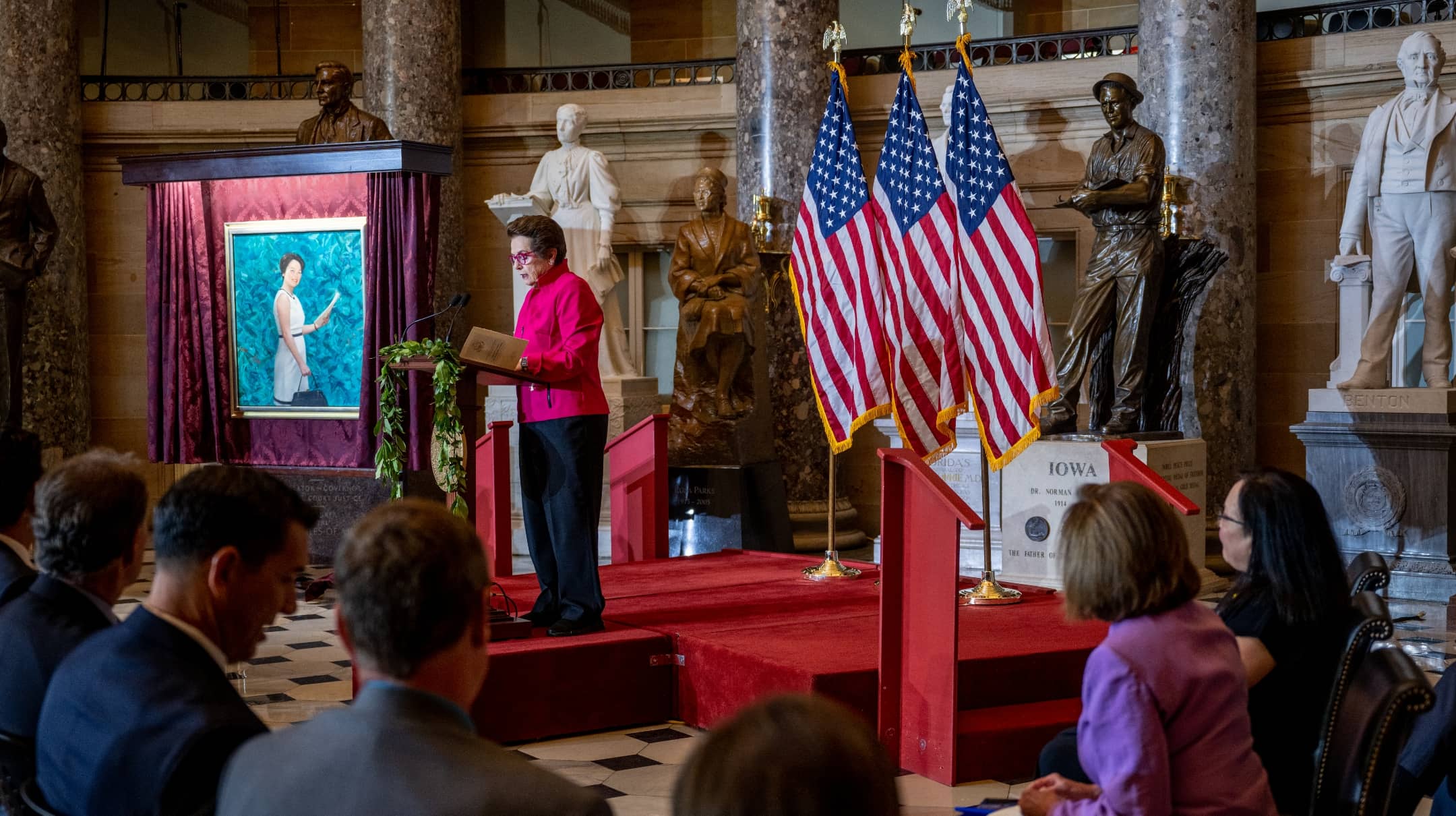WSF Founder Billie Jean King speaks during the unveiling of a portrait of the late Rep. Patsy Mink (D-HI) in the National Statuary Hall at the U.S. Capitol on June 23, 2022 in Washington, DC during the 50th anniversary year of Title IX. (Photo by Brandon Bell/Getty Images)
Imagine that you live in a society where girls and women are virtually excluded from playing sports and there is no such thing as a women’s athletic scholarship, and even if there was, there is no legal framework in place to protect girls and women against discrimination when it comes to equal access to resources that help sports programs thrive, including facilities, equipment and coaches. Astonishing, right? That is what the U.S. looked like for girls and women pre-Title IX – limiting and stifling.
It took bold action from members of Congress like Representatives Patsy Mink, Birch Bayh, and Edith Green and advocates like Bernice Sandler and Billie Jean King, to demand more for girls and women in the United States.
Thanks to the tenacity and grit of the trailblazers who preceded us, Title IX was signed into law on June 23, 1972, and for nearly 52 years it has paved a path to progress in sports and education that we continue to champion and protect so girls and women can play, compete and lead – in sports and beyond – without barriers.
The landmark legislation’s seismic impact on society is undeniable. If you look around high school gymnasiums, collegiate stadiums, professional arenas and boardrooms, you will find girls and women reaping the benefits of its 37 words, as women athletes, coaches and leaders continue to smash records, shatter glass ceilings and crush outdated assumptions. We are only halfway through 2024, and we have seen 18.7 million viewers tuning into the NCAA Women’s Basketball March Madness Tournament, the PHWL continuing to play in front of sold out crowds and the NWSL landing the largest media-rights deal in women’s sports history. We also continue to see women coaches securing historic contracts, and women at the executive level making their mark as CEOs, presidents, commissioners, general managers, and owners.
These strides towards equity that are allowing girls and women to live out their athletic and professional dreams today, would not be possible without Title IX. Though its impact has been transformational, its full promise has yet to be met. According to the Women’s Sports Foundation’s (WSF’s) research report, “50 Years of Title IX: We’re Not Done Yet,” girls’ participation in high school sports, while almost 12 times higher than it was in 1972, has still not reached the same level of boys participation pre-Title IX. Even today, girls miss out on an estimated 1 million sports participation opportunities in comparison to boys. This opportunity gap is widest among girls and women of color, LGBTQ+ youth and those with disabilities — all of whom consistently have fewer opportunities than their peers.
The inequities persist beyond sport participation at both the high school and collegiate level, where Title IX compliance by institutions often falls short, preventing the law’s full promise to be met for all girls and women in athletics. Enforcement largely relies on students, parents and coaches reporting inequitable treatment and participation opportunities, but WSF’s research shows that 51% of high school athletic administrators do not know who their Title IX coordinator is, while 83% of college coaches say they have never received any formal Title IX training. To dive deeper, even if a violation were to exist, studies show reports may never be filed for fear of negative repercussions or losing their jobs.
Sport is not a “nice-to-have,” but a “must-have” for all girls and women, and it is something that we as a society must fight to invest in.
The lifelong benefits that come with sport participation lay a solid foundation for girls and women that transcends the playing field, including confidence, character, teamwork and self-discipline. An enlightening stat in an Ernst & Young study shows that 94% of women in the C-suite played sports, with 52% having played at the collegiate level. Sport is building up a generation of leaders; and, even if girls and women do not go on to become professional athletes, the societal and cultural benefits help open many doors for them.
June 23, marks the 52nd anniversary of Title IX and we want the day to serve as a reminder that despite the tremendous growth in women’s sports, there is still work we can all do in strengthening the pipeline and access for girls and women so they reach their full potential on and off the field.
Learn more about Title IX by:
- Follow our #TakeActionTuesday posts throughout the month of June where you will learn ways to advocate for greater awareness and compliance in your communities.
- Instagram, TikTok, Threads and Facebook: @WomensSportsFoundation
- Twitter: @WomensSportsFdn
- Sign up for our newsletters to keep up with the latest Title IX news and other stories impacting girls and women in sports.
- Donate in honor of #WSF50 and help us carry Title IX into the next 50 years, as we continue to champion the entire women’s sports ecosystem!
If you’re noticing inequities taking place at your or your child’s school, email us at Advocacy@WomensSportsFoundation.org for guidance on next steps!
*The majority of this text first appeared in The Hill.*



